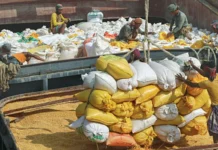By Siddique Islam
The European Parliament has asked Bangladeshi authorities to put in place health and safety measures to prevent a recurrence of the clothing factory fire last year that saw more than 111 people lose their lives.
The call comes after a resolution was adopted by Members of the European Parliament (MEPs) last week. It will now be sent to authorities including the Bangladesh government and EU Member States.
The European Parliament also urged the governments of Bangladesh and Pakistan to ensure all manufacturers comply with health and safety legislation (notably the Labour Act (2006) in Bangladesh) and to establish an effective and independent system of labour and building inspections. At least 289 people also died at a garment factory in Karachi in the last year.
It also wants the governments of the two countries to lift restrictions on trade union activities and collective bargaining
The MEPs also urged all stakeholders to work to combat corruption in the supply chain in many South Asian nations, including collusion between safety inspectors and factory owners.
And they want major international garment brands to critically investigate their supply chains and to cooperate with their subcontractors to improve occupational health and safety.
Currently, Europe is largest export destination of Bangladeshi goods, buying 60% of the country’s apparel products.
During the debate on the resolution, major apparel brands and retailers were criticised.
Irish Socialist MEP Paul Murphy condemned the failure of European big business to keep to their own “moral but useless” code of conduct, and said responsibility for the deaths lies with both the owners of these factories as well as with European businesses who source there.
“Bangladesh is the world’s second largest clothing exporter. Its clothing trade was worth $19bn in 2011 alone, with its factories producing for major brands like Tommy Hilfiger, Gap, Calvin Klein, H&M and Walmart,” the MEP said.
Murphy also drew attention to denim jeans sandblasting, a common industry practice in Bangladesh that puts workers at risk of contracting silicosis and lung cancer due to the silica particles they inhale.
“The Bangladeshi government should ban all forms of sandblasting, but also implement a public programme to provide social and medical assistance for workers affected by silicosis,” he added.
“The EU must implement an import ban on sandblasted jeans if it is serious about protecting the health of workers in the most exploitative industries.”
Source: Just Style.com









